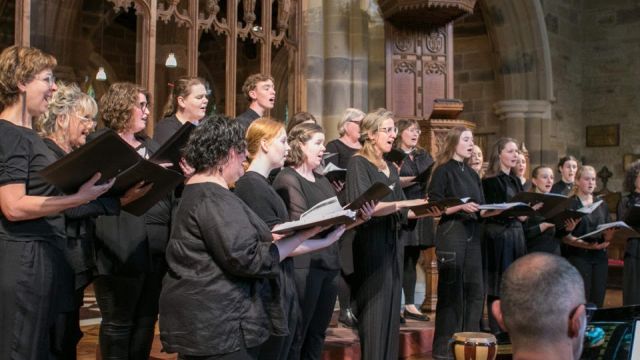JESSA Spring Concert
JESSA (Jane-Edwards-Soprano-Soprano-Alto) is a new treble choir filling the niche in the Hobart choral scene encompassing classical repertoire, accessible new work and delightful reinterpretations of well-known standards.
Having premiered during the 2022 Festival of Voices, the choir has grown into something of substance, power and great beauty. Treble choirs can frequently lack the harmonic resonance provided by the lower voices but carefully chosen repertoire ensures there a rich texture and varied timbre. Many choristers are mature and experienced voices. Others are students or ex-students of Jane Edwards.
Edwards is a woman of significant reputation, with a background in opera, chamber music and musical theatre. She is assisted by the inimitable Michael Power, who steps from behind the piano on occasions to offer rhythmic accompaniment.
The repertoire for the Spring Sing at St David’s Cathedral on October 21st was challenging, engaging and uplifting.
Many works were based on well-known texts, for example Walter Whitman’s ‘On the Beach at night alone’ by Eugene Butler. ‘Ask me no more’ (Gray) with text by Shakespeare and ‘The Song of Shadows’ with text by Walter de La Mare, were songs of particular beauty. JESSA was able to evoke the ethereal qualities of a youth choir in these numbers but was especially lush and rich in ‘Ask me no more’.
The second number was the opening movement of Karl Jenkins ‘Adiemus’. Often associated with younger voices, this was performed with an energy that was appreciated by the audience. The recorder solo was given by Cate Young. The choir managed the difficult lyrics in what endures as an audience favourite.
It was appropriate for a Tasmanian choir to include the work of Ben van Tienen. ‘Hear Me’ was powerful and poignant. Van Tienen is a young Tasmanian composer and conductor working in London, who maintains a strong connection to his home. Van Tienen wrote the ‘Isolated Songs’ especially for the TSO chorus during lockdown. ‘Hear Me’ was written when Van Tienen was associated with Gondwana Choir and expresses a similar need to be heard and understood.

Whitacre’s ‘Sing Gently’ was an apt inclusion in a similar vein. Stephanie Arnold took a lovely solo in ‘Who can sail without the wind?’.
Included in the programme were several reworkings of traditional songs: ‘Hush, Little Baby’ (Miller), ‘Skye Boat Song’ (Langford) and ‘The Gift to be Simple’ (Chilcott). These were interesting modern arrangements. ‘Skye Boat Song’ with Michael Power on the drum was a stirring version of the traditional tune.
‘Summertime’ (Gershwin) was given as audiences are accustomed to hearing it with sustained notes that were penetrating yet never strident. The first sopranos, many excellent soloists in their own right, worked particularly hard throughout the concert without sacrifice to tone at any point.
‘Laudate Dominium’ (Dubra) was the highlight of the first half. This was a challenging piece of tight harmonies, melismatic parallel lines and challenging modulations. The Cathedral was the right venue in which to hear this.
‘Vuelie’ (Fjellheim, arr Beck) acted as a bookend piece to Jenkins’ ‘Adiemus’. From the Frozen score, this piece combined the best of JESSA; beautiful long lines and bold rhythms, all coherent and clear.
‘Mambo Italiano’ was vibrant piece with which to finish. This was tight and well-articulated. Gracie Middleton took the solo; the audience took home an earworm.
Jane Edwards is knowledgeable and exacting. Under her direction and in a short time, JESSA has become something quite special.
Anne Blythe-Cooper
Subscribe to our E-Newsletter, buy our latest print edition or find a Performing Arts book at Book Nook.

